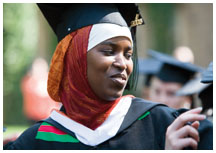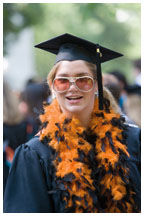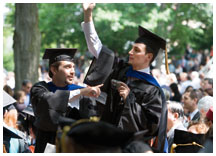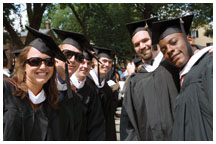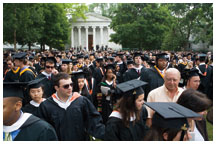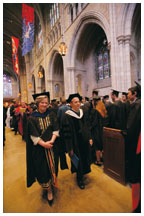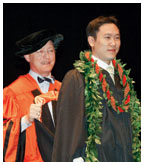
|
July 19, 2006: Features
|
Hindi Hussein ’06 at Commencement
Kathryn Anne Kerner ’06 celebrates in Tiger style.
Ph.D candidates Georgios Skretas *06, left, and M. Reza Banki *05, both in chemical engineering, find friends in the crowd. Banki completed his degree in November but returned for Commencement.
From left, Ali Smith, Nate Starrett, Charles Bahlert, Dave Ochotorena, Paul Daou, and Abi Fadeyi smile for a photo shortly before becoming alumni.
Anya Li ’06 and Ted Yeh ’06 enjoy a quiet moment before Commencement. After the ceremony, graduates flock to Cannon Green to pick up their diplomas. |
Commencement 2006
Photographs by Ricardo Barros
On a Commencement day marked by traditional ceremony and giddy celebration, President Tilghman sent the Class of 2006 out through FitzRandolph Gate with a sobering challenge.
“In your time at Princeton you have been encouraged ... to develop the suppleness of mind to see what lies between black and white; to reject knee-jerk reactions to ideas and ideologies; to recognize the nuance and complexity in an argument; to differentiate between knowledge and belief; and to appreciate that changing your mind is a sign not of weakness but of strength,” Tilghman told the graduates on the Nassau Hall lawn, who were spared the rain that had put a damper on Reunions. “We have asked that you be open to new ideas, however unorthodox; to shun the superficial trends of popular culture in favor of careful analysis; and to recognize propaganda, ignorance, and baseless revisionism when you see it.”
Tilghman then exhorted the graduates — 1,108 undergraduates and 661 graduate students — to address problems that her generation had helped to create: global warming, the HIV/AIDS pandemic, immigration, and the erosion of quality public education. To do this, she said, graduates must “find a way to rise above partisanship and polarization, to find common ground.”
It was a theme echoed by valedictorian Chris Douthitt ’06, who urged his classmates to apply lessons of critical thinking and problem solving that they learned at Princeton in a world that “mostly reasons backwards.” But Douthitt, a music major who wrote the music and lyrics for three rock songs for his senior thesis, also reminded classmates never to take themselves too seriously, and to do bold things.
Students punctuated the sea of black Commencement gowns with leis and other colorful personal touches, and snapped photos from their seats. Some wore special stoles, adorned with the Princeton shield and reflecting a Kenta-cloth design, which they had received at a first-ever Pan-African graduation ceremony honoring students with African heritage.
Commencement capped several days of festivities during which graduates heard advice from humorist David Sedaris at Baccalaureate and former president Bill Clinton, who spoke at Class Day (see coverage of Clinton’s talk on page 16).
During the Commencement ceremony, the University honored outstanding teaching, presenting President’s Awards for Distinguished Teaching to four Princeton professors: William Bialek (physics), Joel Cooper (psychology), William Gleason (English), and Sankaran Sundaresan (chemical engineering). Four New Jersey secondary school teachers also were honored, including Katherine Princiotta ’96, a science teacher at West Windsor-Plainsboro High School South. Princeton bestowed honorary degrees on six men and women for their contributions to science, health care, athletics, literature, education, and civil rights (see story on page 45).
As Commencement-week speakers suggested, the graduates have their work cut out for them — but they have had a head start. Waiting for Commencement to begin, members of the Class of 2006 reflected on what had drawn the class together, particularly their service in response to Hurricane Katrina and the 2004 tsunami in Southeast Asia. “We did so much in terms of raising money” through benefit concerts, T-shirt sales, and events hosted by residential colleges and eating clubs, said Samantha Adamson ’06. “People really kept it up.”
Morgan Galland ’06 had a different take on what brought her class together. In addition to study breaks and other social events that encouraged a “tight class,” she said, the Class of 2006 was “defined by grade deflation.” Although most students hated it, she said, they laughed about it and shared in common misery, making their bonds stronger.
For many graduate students, Commencement marked the triumphant end of a long and sometimes painful road. Kimberly Regan *06, who finished her doctorate in chemistry last August, said her five-and-a-half years on campus were filled with both great joy when she discovered something new, and “tear-filled frustration” when her experiments didn’t go well and she wondered where her research was heading.
After walking through FitzRandolph Gate, Brandon Parry ’06 said
he would miss the sense of serenity he feels on the campus. Last summer,
after taking the train from his Manhattan job back to campus one evening,
he stepped off the Dinky into a misty night filled with fireflies and
felt relief. “Even if the buildings change and the people change,”
he said, “Princeton will always feel like home.” ![]()
By K.F.G.
To the Class of 2006
 “I know, this is
Princeton, and there are plenty of 57-year-old men trapped in 22-year-old
bodies out there. But let’s have the presence of mind to do stupid,
bold things with our lives, and to never take ourselves so seriously that
we can’t toss everything we’ve learned out the window when
the time is right.”
“I know, this is
Princeton, and there are plenty of 57-year-old men trapped in 22-year-old
bodies out there. But let’s have the presence of mind to do stupid,
bold things with our lives, and to never take ourselves so seriously that
we can’t toss everything we’ve learned out the window when
the time is right.”
Valedictorian Chris Douthitt ’06
 “Tell me the story,
Muse, of the crafty students who — having written so many letters
for their theses — received only one in return, a letter which was
sometimes the cause of joy and sometimes the cause of wailing. So great
an effort it was to overcome our academic labors” [translated from
the Latin].
“Tell me the story,
Muse, of the crafty students who — having written so many letters
for their theses — received only one in return, a letter which was
sometimes the cause of joy and sometimes the cause of wailing. So great
an effort it was to overcome our academic labors” [translated from
the Latin].
Salutatorian Dan-el Padilla Peralta ’06
(John Jameson ’04/Office of Communications)
Academic attire Richard Liao, who received a master's degree in operations research and financial engineering, gets his academic hood from Doug Clark, professor of computer science, at the Graduate School's annual hooding ceremony Monday, June 5. Almost 270 advanced-degree students participated in the ceremony, which took place at McCarter Theatre. (Beverly Schaefer) |
Baccalaureate
David Sedaris: My Princeton
Humorist David Sedaris entertained the Class of 2006 at the Baccalaureate service with a whimsical tale describing what Princeton was like when he was a student in a fictional era in which students attended modesty seminars, majored in patricide, and took classes on idol worship.
“Back then, we were on a pass-fail system,” he said at his talk June 4. “If you passed, you got to live. And if you failed, you were burned alive on a pyre that is now the transgender studies building.” The system “kept you on your toes,” explained Sedaris, who actually graduated from the Art Institute of Chicago. “If I’d been burned alive because of bad grades, my parents would have killed me.”
When Sedaris informed his parents that he intended to major in comparative literature, they were not pleased. “Dad followed his ‘I’m so disappointed’ speech with a lecture on career opportunities. ‘You’re going to study literature and get a job doing what? Literature-izing?’”
Eventually the wayward graduate ended up publishing a book of stories
about his family. The genesis of his writing career? “Writing parodies
of articles in the alumni magazine.” ![]()
By Amy Sennett ’06
Senior Awards
Harold Willis Dodds Achievement Award
(to the senior
who best embodies Dodds’ qualities of scholarship and service):
Claire Woo
Allen Macy Dulles ’51 Award
(to a senior whose actions fulfill Princeton’s informal motto of
service): David Mann-Podrasky
Frederick Douglass Service Award
(for contributions to a deeper understanding of the experiences of racial
minorities): Juan Gonzalez
The Class of 1901 Medal
(awarded by the class to the senior who has done the most for Princeton):
Leslie-Bernard Joseph
W. Sanderson Detwiler 1903 Prize
(awarded by the class to the senior who has done the most for the class):
Christopher Lloyd
Priscilla Glickman ’92 Memorial Prize
(to students who demonstrate independence and imagination in community
service): Laura Collins and Sara Colon
Honorary Degree Recipients
Six people received honorary degrees in recognition of their achievements. (Italicized text is drawn from their citations.)
 JOHN T. BONNER,
DOCTOR OF SCIENCE George M. Moffett Professor of Biology, emeritus.
An unabashed champion of Darwin, he continues a highly productive
lifetime of scholarship in a sustained attempt to explain nature to himself
and others. ... He has been a generous colleague, a gentle but effective
administrator, an inspiring teacher, a determined anti-reductionist, and
a teller of tales whose gracefully written and highly accessible essays
have successfully focused our attention on the “big” questions
of science.
JOHN T. BONNER,
DOCTOR OF SCIENCE George M. Moffett Professor of Biology, emeritus.
An unabashed champion of Darwin, he continues a highly productive
lifetime of scholarship in a sustained attempt to explain nature to himself
and others. ... He has been a generous colleague, a gentle but effective
administrator, an inspiring teacher, a determined anti-reductionist, and
a teller of tales whose gracefully written and highly accessible essays
have successfully focused our attention on the “big” questions
of science.
 PAUL E. FARMER,
DOCTOR OF LAWS Physician and medical anthropologist. From
rural Haiti to war-torn Rwanda to inner-city Boston, this anthropologist-physician
has devoted his significant talents to saving lives. ... His prescription
for social justice includes attention to the social forces, from poverty
and racism to war, that weaken our immune systems; his crusade aims to
secure better health not only for the body, but for the body politic.
PAUL E. FARMER,
DOCTOR OF LAWS Physician and medical anthropologist. From
rural Haiti to war-torn Rwanda to inner-city Boston, this anthropologist-physician
has devoted his significant talents to saving lives. ... His prescription
for social justice includes attention to the social forces, from poverty
and racism to war, that weaken our immune systems; his crusade aims to
secure better health not only for the body, but for the body politic.
 MIA HAMM, DOCTOR
OF HUMANITIES Soccer star. For men and women around the world,
but especially for girls in this country, she has personified
the achievement of excellence, the expansion of opportunity, and the determination
needed to overcome defenders of opponents’ nets and limitations
on the participation of women in sports.
MIA HAMM, DOCTOR
OF HUMANITIES Soccer star. For men and women around the world,
but especially for girls in this country, she has personified
the achievement of excellence, the expansion of opportunity, and the determination
needed to overcome defenders of opponents’ nets and limitations
on the participation of women in sports.
 SEAMUS HEANEY, DOCTOR
OF LETTERS Poet, translator, and essayist. His writings move
the heart and stir the conscience. He has an unprecedented, and unparalleled,
ability to make words equal to the world, and the world to words, so that
one may not insert so much as a knifepoint between the two.
SEAMUS HEANEY, DOCTOR
OF LETTERS Poet, translator, and essayist. His writings move
the heart and stir the conscience. He has an unprecedented, and unparalleled,
ability to make words equal to the world, and the world to words, so that
one may not insert so much as a knifepoint between the two.
 FREEMAN A. HRABOWSKI
III, DOCTOR OF LAWS Educator and mathematician. He has spent
his life teaching that the best weapon is knowledge and the best training
ground is the classroom and research lab. His programs to nurture and
support young African-Americans have helped them succeed in unprecedented
numbers, proving his theorem that it is “cool to be smart.”
FREEMAN A. HRABOWSKI
III, DOCTOR OF LAWS Educator and mathematician. He has spent
his life teaching that the best weapon is knowledge and the best training
ground is the classroom and research lab. His programs to nurture and
support young African-Americans have helped them succeed in unprecedented
numbers, proving his theorem that it is “cool to be smart.”
 DOLORES HUERTA,
DOCTOR OF LAWS Activist and co-founder of the United Farm Workers
union. Outraged by the daily specter of students too hungry to learn,
she traded the classroom for the picket line. ... Through her insatiable
hunger for justice — La Causa — and her tireless advocacy,
she has devoted her life to creative, compassionate, and committed citizenship.
DOLORES HUERTA,
DOCTOR OF LAWS Activist and co-founder of the United Farm Workers
union. Outraged by the daily specter of students too hungry to learn,
she traded the classroom for the picket line. ... Through her insatiable
hunger for justice — La Causa — and her tireless advocacy,
she has devoted her life to creative, compassionate, and committed citizenship.

